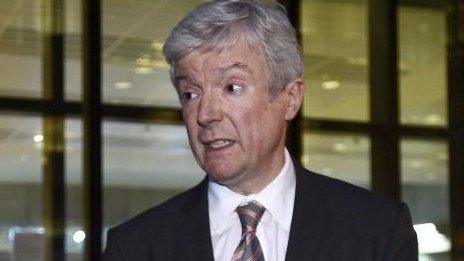Tony Hall's challenges as BBC director general
- Published

Tony Hall oversaw the launch of BBC News 24 and BBC News Online
As Tony Hall arrives back at the BBC, four months after he was appointed as director general and 12 years after he left for the Royal Opera House, he can be in no doubt about the scale of the challenge he has taken on.
On Thursday, thousands of BBC staff went on strike, an unwelcome reminder that job and budget cuts will be near the top of his in-tray.
Leaders of the National Union of Journalists and the broadcasting union Bectu claim plans to cut 2,000 jobs over five years have led to "compulsory redundancies, unacceptable workloads and stress, and increased cases of bullying and harassment".
The BBC imposed 20% budget cuts after the freezing of the licence fee and new obligations to pay for the BBC World Service and the Welsh fourth channel S4C.
Meanwhile, arts leaders including National Theatre artistic director Sir Nicholas Hytner have focused on Lord Hall's previous role at the Royal Opera House, urging him to improve arts programming.
Sir Nicholas accused the corporation of having a "Downton ratings mentality" and said it was not doing enough to put the arts on television.
New management
And that is on top of the problems that led to Hall's appointment in the first place, when the BBC was plunged into crisis over the Jimmy Savile scandal, which led to the sudden resignation of his predecessor George Entwistle.
Lord Hall hopes his arrival will open a new chapter for the BBC, allowing it to put those problems behind it and focus on the future.

BBC staff have staged two walkouts so far this year
Announcing his first senior appointments two months ago, he said: "It is my first task to build the team that will deliver a new strategy and creative vision for the BBC and define public service broadcasting for the next decade."
That will include negotiating the next BBC charter and licence fee settlement with the government.
Lord Hall sprang a surprise in February when he made James Purnell, the former Labour culture secretary, a key member of his top management team.
Purnell is to take on a new and wide-ranging role as director of strategy and digital, pulling together the BBC's policy-making, future media and communications activities, including marketing and audience research.
The appointment of a former Labour culture minister, without a formal selection process, caused some controversy among Conservative MPs, although the government expressed no objection.
Purnell was the BBC's head of corporate planning under John Birt, the director general who introduced radical changes to modernise the corporation 20 years ago.
He set out his thinking - some called it a job application - in an article in the Financial Times, external last November, headed "The BBC should learn from the Birt era".
Purnell wrote: "The BBC was saved by Lord Birt's boldness. It would have been easy to play it safe, to avoid mistakes, lest they incense the BBC's enemies. But instead it reviewed its programmes, transforming Radio 1 as well as its output of drama and entertainment.
"Rather than wait and see what the internet would bring, as ITV essentially did, the BBC rode the wave of a country surfing online. The next director-general needs to learn from the 1990s."
'Out of touch'
Lord Hall is well placed to do so. He became director of news in Birt's 1993 reorganisation, with a brief to bring TV and radio news together for the first time. He later launched Radio 5 Live, BBC News 24 and BBC News Online.
He is bringing in another outsider to a key role. Anne Bulford was chief operating officer at Channel 4 (where Hall was a board member for several years) and before that was finance director of the Royal Opera House (where he was chief executive).
She has been made managing director of BBC finance and operations on a salary of £395,000.
That is less than she earned at Channel 4, but has prompted reminders of another long-running BBC problem that Lord Hall must face up to - senior management pay.

Several inquiries are set to be published into the culture and practices at the BBC
Tory MP John Whittingdale, chairman of the Commons culture, media and sport select committee, said: "At a time when the BBC are saying they are having to cut back on programme budgets because of the squeeze on the licence fee, it is extraordinary that they think this is an appropriate amount to pay in public money to an individual, however good.
"It demonstrates they are still completely out of touch with the world in which most people have to live today."
Two current BBC directors have moved to new roles. Helen Boaden, who was director of news for eight years, has been made director of radio, while Tim Davie, who has been acting director general for the past four months, moves to a role in charge of the BBC's global activities.
Workplace culture
One of Lord Hall's first tasks will be to appoint a new director of news and a new director of television.
The news role is particularly important following the criticisms of the handling of two Newsnight crises - one over the failure to broadcast the original investigation into allegations against Jimmy Savile and the subsequent programme that led Lord McAlpine to be wrongly implicated in claims of child abuse.
That job is widely expected to go to an outsider.
While he wants the BBC to make a fresh start and look to the future, Lord Hall also knows that the reverberations from Savile will continue for a while longer and that there are lessons still to be learned, both cultural and managerial.
Further revelations will continue to emerge, prompted by the accusations of sexual abuse by Savile and others. The Dame Janet Smith Review, which is examining the culture and practices within the BBC during Savile's time, has heard from hundreds of witnesses and will report later in the year.
Before then, another inquiry, headed by Dinah Rose QC, will report on the current culture at the BBC, amid accusations that bullying and harassment still go on in the corporation.
Lord Hall must also tackle a management culture described by the chairman of the BBC Trust Lord Patten as "dysfunctional" and "chaotic" in evidence to the Pollard Review of the Savile affair.
But he will also be aware that, in the end, the BBC must be judged on its creativity - "it's the programmes, stupid" - and its relationship with its audiences. And these in turn will continue to be affected by the rapid changes in technology that have transformed the media landscape in recent years.
From radio to television to online and the iPlayer, the BBC has always managed to keep in touch with the future. That may prove Lord Hall's hardest task in the coming years.
- Published2 April 2013
- Published2 April 2013
- Published29 March 2013
- Published28 March 2013
- Published28 March 2013